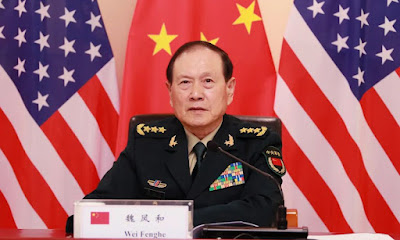SINGAPORE — China’s defense minister has slammed America’s approach to the Indo-Pacific region, calling it “a strategy to create conflict and confrontation, to contain and encircle others.”
Speaking at a plenary session at the Shangri-La Dialogue in Singapore, Gen. Wei Fenghe said the strategy is “an attempt to build an exclusive, small group in the name of a free and open Indo-Pacific” and to hijack regional countries to be used to target “one specific country.”
Wei also defended China’s development and growth at the event, which was hosted by the London-based International Institute for Strategic Studies and took place June 10-12. China is building up its military strength and has created artificial islands, despite international pressure. He noted that the country’s progress was not achieved through colonialism and is not a threat.
As a juxtaposition, he pointed to China’s provision of COVID-19 vaccines to countries around the world, deployment of personnel for U.N. peacekeeping missions and contribution toward anti-piracy efforts around Africa.
Wei also touched on the self-governed island of Taiwan, which Beijing considers a rogue province and has vowed to reincorporate, by force if necessary. The minister criticized the Taiwan Relations Act as a “domestic law [used] to interfere in the internal affairs of another country.”
The U.S. legslation, passed by Congress in 1979, obligates the U.S. to supply arms to Taiwan that are deemed necessary for the latter’s self-defense. But the U.S. government has also stated it is officially opposed to Taiwanese independence, instead seeking to maintain the status quo.
Wei decried the current Democratic Progressive Party government of Taiwanese President Tsai Ing-wen, accusing it of seeking “incremental” independence and ignoring the 1992 consensus. The consensus was the result of a meeting between semiofficial representatives of China and Taiwan, with some claiming both sides agreed there is one China, while others disagree an agreement was reached.
Wei also maintained China’s approach toward the war in Ukraine, refusing to call it the result of a Russian invasion and instead expressing regret at ongoing events and reiterating that Beijing respects the sovereignty and territorial integrity of all countries, as well as the “legitimate security concerns” of nations.
During a Q&A session following the speech, a conference attendee asked Wei about suspected missile silos seen in satellite photos of western China and their possible use for nuclear intercontinental ballistic missiles.
He did not answer directly, instead discussing in general terms the People’s Liberation Army’s nuclear forces and its posture. He said the nuclear weapons on display at the 2019 military parade in Beijing were introduced into service. He also reiterated China’s nuclear arsenal is for self-defense, noting the country would not be the first to use such weapons.
























0 Comments